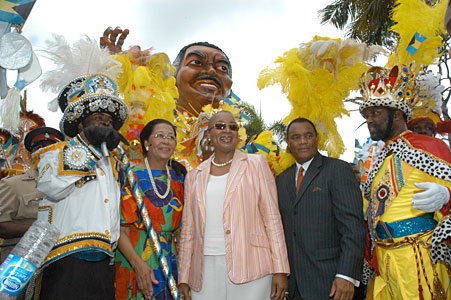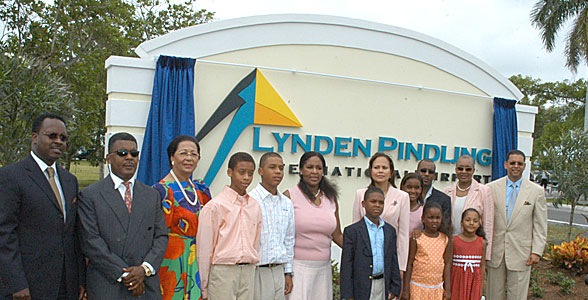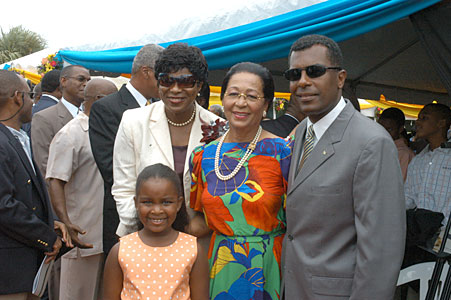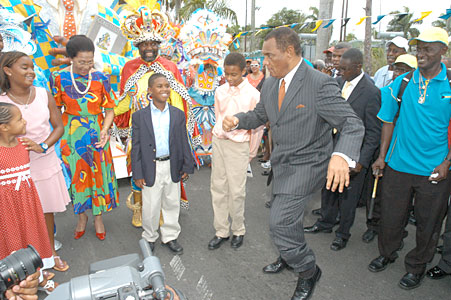BY
THE RIGHT HONOURABLE PERRY G. CHRISTIE MP
PRIME MINISTER
OF
THE COMMONWEALTH OF THE BAHAMAS
AT
THE CEREMONY RE-NAMING
NASSAU INTERNATIONAL AIRPORT
THE
LYNDEN PINDLING INTERNATIONAL AIRPORT
JULY 6th, 2006


Ladies and Gentlemen; let me begin by indicating that it is important for the Bahamian public to have heard the commitment of the Government in what has just been said by the Minister of Transport.
My Government is about to embark on a new and defining experience at this airport. This new and defining experience will involve a new approach through long-term first-class international management and an expansion, renovations and refurbishment that will give The Bahamas a truly world-class international airport.
Our commitment is directly linked to ensuring that as the billions of dollars of resort expansion continues here in Nassau and on other islands of The Bahamas; we – for our part – would have guaranteed that this, the major gateway into the country matches in every respect the new and modern facilities.
This is one of those moments in our life as a national family when all Bahamians of whatever racial hue, of whatever political stripe and of whatever social station, should rise above their differences to join hands and hearts in common praise for the Father of our Nation.
 That
the vast majority of Bahamians have already coalesced into such a chorus
I have no doubt. But it would be an infinitely more wonderful thing
if all Bahamians could somehow be bonded as one at a moment such as this
so that we might all be able to sing the same song in a true spirit of
national harmony.
That
the vast majority of Bahamians have already coalesced into such a chorus
I have no doubt. But it would be an infinitely more wonderful thing
if all Bahamians could somehow be bonded as one at a moment such as this
so that we might all be able to sing the same song in a true spirit of
national harmony.
Some may think that in expressing such a hope I am asking too much. In speaking for myself, however, I am not at all persuaded that I am.
And I say that because when the full measure of Lynden Pindling’s life is taken, when all his books are balanced, the verdict of history must surely be that all Bahamians were the beneficiaries of the good Lynden Pindling did for this country, irrespective of whether they were for him or against him.
If that is indeed the case, as I am convinced it is, then surely this is an occasion that should unite all Bahamians in respectful remembrance and appreciation of the life of a man who served them well.
Let us be clear about this.
Whether it was the educational transformation of The Bahamas during the Pindling era, or the Bahamianization of the workforce, or the diffusion of our nation’s wealth among the many and not just the privileged few, or the attainment of national independence for the Bahamian people, or the introduction of social security in the form of the National Insurance Scheme, or the elevation of women to full equality in all spheres of our society – whether it was in any of things or in all of them together, the fact of the matter is that all Bahamians were the beneficiaries of what Pindling and his government did, irrespective of whether you were black or white, PLP or FNM, man or woman, social big-shot or common man.
We were all lifted together. We were all raised up together.
 Rest
assured that this is not some tall tale that is being told. This
is not revisionist history nor is it myth-making. Rather, these are
incontrovertible statements of historical fact that I am making here this
morning.
Rest
assured that this is not some tall tale that is being told. This
is not revisionist history nor is it myth-making. Rather, these are
incontrovertible statements of historical fact that I am making here this
morning.
In this regard it would perhaps do us well to remind ourselves that you can argue with opinions all you want but you can never argue with facts. And the fact of the matter is that when Lynden Pindling led our country to do the things I have just catalogued, all Bahamians were nourished by the fruits of his great endeavours.
There is one other aspect of the Pindling legacy that I feel I should make special mention of today.
Too few of us, I think, have taken the time to develop a correct understanding and appreciation of just how wise and sensible a leader Lynden Pindling really was - especially in 1967 when he had the whole world in his hands.
At the snap of his fingers he could have broken Bay Street’s back. To paraphrase Shakespeare, he could have cried “ havoc! and let slip the dogs of war”, as indeed many of his more radical counterparts were doing in post-colonial Africa, Asia, and the Caribbean. He could have blown to bits the economic colossus that he met in place and laid the rough hand of recrimination and reprisal upon those who had themselves laid the rough hand of oppression on the Bahamian people all through the years.
But Lynden Pindling chose another way. He adopted a live-and-let-live philosophy of governance. Not only did he not persecute or punish the erstwhile oppressors of the masses, he fostered reconciliation with them, enabling them to live in peace and security, and to flourish as they had never flourished before.
It would not be until Nelson Mandela came to power in South Africa almost a quarter of a century later and did the same thing that many of us in this country would develop an understanding of what a far-thinking and level-headed leader Lynden Pindling really was, and what a stupendous accomplishment the Peaceful Revolution of 1967 represented for all classes of Bahamian society, and what it represented for the future stability and prosperity of The Bahamas.
But it’s amazing, isn’t it, how seldom Lynden Pindling is ever given any credit for that. It’s amazing, isn’t it, how even now, after all these years, there are still some who would begrudge him credit even for that.
But never mind.
The vast majority of the Bahamian people are deeply appreciative of Lynden Pindling as man and statesmen, as patriot and nation-builder, and as National Hero par excellence.
 His
legacy continues to represent a priceless part of our national heritage.
His importance to us and to our history as the Great Liberator and Father
of the Nation assure him the highest place of honour in the pantheon of
Bahamian heroes, not just for today but for all time.
His
legacy continues to represent a priceless part of our national heritage.
His importance to us and to our history as the Great Liberator and Father
of the Nation assure him the highest place of honour in the pantheon of
Bahamian heroes, not just for today but for all time.
Against that background, then, it is historically correct that we should name this facility after Lynden Pindling. It is also perfectly appropriate that we should do so – and do so, moreover, with pride and without apology.
This airport is our nation’s major gateway to the rest of our archipelago no less than it is the major point of arrival from, and departure to, the wider world. This airport in our nation’s capitol is where millions come and go each year. There is no place else in this country where more people, be they Bahamian or visitor, will ever see any name more prominently emblazoned in tribute above any building or upon any wall.
Such is the prominence of this airport as a national landmark and point of embarkation that its re-naming should properly be reserved for a national hero of the very first magnitude. And of all our national heroes there is none more deserving of this special form of national recognition than the late Prime Minister and Father of the Nation, the Right Honourable Sir Lynden Pindling.
In re-naming our nation’s main airport after the pre-eminent builder of the modern Bahamas, we are also following a practice that has found acceptance around the world.
In our own region, examples of this practice abound. One need only call to mind international airports such as the Norman Manley International Airport in Jamaica; the Grantley Adams International Airport in Barbados; and the Robert L. Bradshaw International Airport in St. Kitts & Nevis, from which I returned only last night.
Other examples in our hemisphere include Reagan International Airport in the American capitol, and the Lester B. Pearson International Airport in Canada.
On the other side of the Atlantic, the Charles de Gaulle Airport in Paris represents another notable example.
In all these cases, and in many others, the naming of the airports constituted a celebration of history and an enduring mark of respect for national heroes of the first order. This was so even in the case of Charles de Gaulle and Ronald Reagan around whose names the clouds of controversy were still swirling and in relation to whom debate was still raging as to the true meaning and worth of their respective legacies.
But as far as this principal airport in our own country is concerned, let me state as directly and unequivocally as I possibly can that the re-naming of this airport after Sir Lynden Pindling is absolutely the right thing to do.
I would not want to complete my intervention this morning without acknowledging in a very special way Marguerite Lady Pindling and her children, Senator the Honourable Michelle Pindling-Sands, Monique Pindling-Johnson, Obi Pindling and Leslie Pindling.
Our nation is indebted to all of you because in many ways your loss was our gain. The time that you gave up so that your husband and father could more completely devote himself to the service of the Bahamian people represented a huge personal sacrifice on your part that deserves to be recognized and appreciated more often.
As for you in particular, Lady Pindling, the contributions you have made in your own right to the development of our country merit national recognition in ways that have thus far not been adequately expressed. We must seek to rectify this as best we can.
As always, however, Sir Lynden himself said it best when
he spoke about his dear wife in the rapturously poetic way that he did
on the occasion of his retirement from politics in 1997. This is
what he said, in part:
“It has been my singular good fortune to have at my
side…..a princess whose bearing, grace and charm made her the toast of
four continents and a lady whose fortitude in the face of the most daunting
adversities …….contributed mightily to my survival and my successes in
public life”.
To those beautiful and poignant words I need add only one of my own : Amen!
Yes, this is a great day for Lady Pindling and the entire Pindling family but it is also a grand moment for all of us who call ourselves Bahamian.
Today, just a few short days from our 33rd anniversary of nationhood, we take time out to memorialize in this very tangible and self-perpetuating way the Father of our Nation.
We therefore now erect his name in honour upon this site. We erect his name with grateful hearts and in fond remembrance of the man who was the greatest of us all.